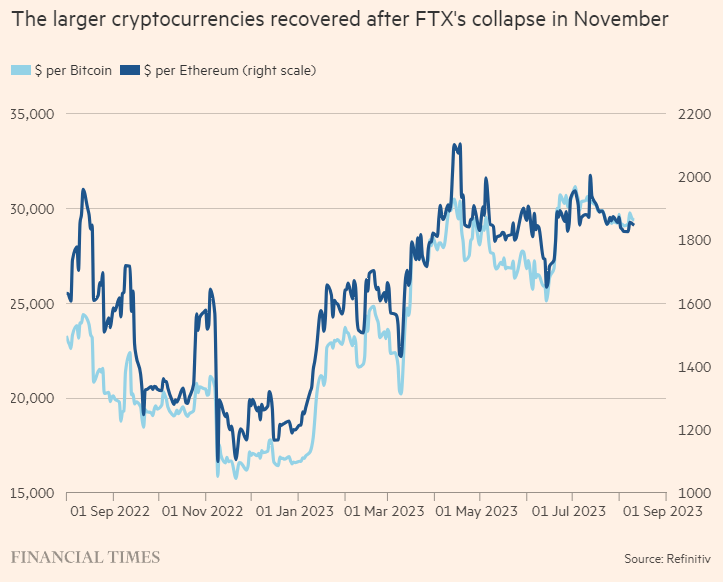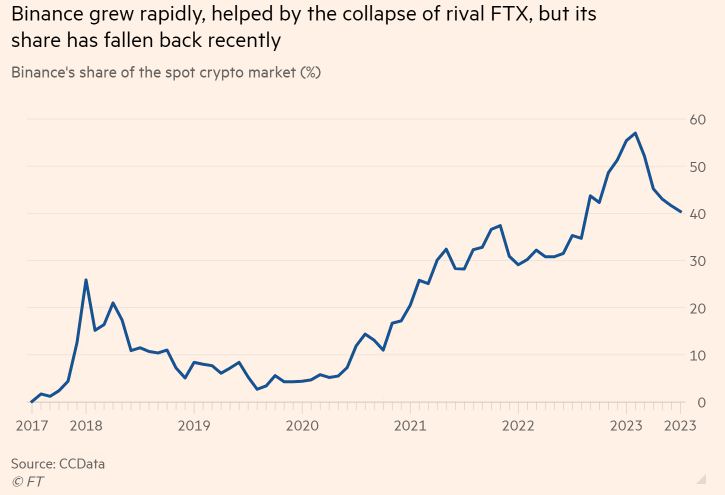Financial Times: Has Binance Lost Its Chance to Dominate the Crypto Market?
Original Title: 《Has Binance blown its chance to rule the crypto markets?》
Author: Scott Chipolina, Financial Times
Translation by: Mary Liu, BitpushNews
As 2022 came to a close, Binance co-founder and CEO Changpeng Zhao (CZ) seemed to have the whole world "under his feet."
Last November, FTX co-founder Sam Bankman-Fried (SBF) reached out to CZ, hoping the Binance CEO could rescue his exchange. CZ declined, which nearly sealed FTX's fate. On November 10, the day before the crypto empire FTX filed for bankruptcy, SBF sent a message to his rival on Twitter: "Well done, you won."
The collapse of FTX made Binance the undisputed "big boss" of the crypto world, controlling more than half of the rapidly growing cryptocurrency market by the end of 2022.
If Binance could weather the regulatory fallout from the FTX collapse, it would become the go-to venue for trading crypto tokens, and CZ could position himself as the "acceptable face" of cryptocurrency, even as many still view the market as the Wild West.
"Many people saw SBF as the leader of the industry and the one who could save it in front of regulators," said Charley Cooper, former chief of staff at the Commodity Futures Trading Commission (CFTC). "When FTX collapsed, everyone looked to CZ as a potential savior for the industry's future."
However, despite the stabilization of major cryptocurrencies like Bitcoin after the FTX collapse, Binance found itself in trouble. Its sheer size made it a target for regulators and lawmakers who wanted to ensure that the broader financial markets would never be impacted by a "too big to fail" cryptocurrency exchange.

In the U.S. alone, financial regulators accused Binance of illegally servicing U.S. customers, mishandling customer assets, and ignoring compliance and anti-money laundering standards.
Binance's size is not just a concern for regulators. Crypto advocates also believe that for an industry that champions decentralized finance, no single participant or entity should theoretically hold too much influence.
Charles Storry, growth director at DeFi project and on-chain index fund provider Phuture, stated, "Binance's predicament highlights the fundamental challenges facing the crypto industry. The tensions between major centralized entities contradict the industry's original ambition to establish a new form of finance based on decentralization, transparency, and a level playing field."
Binance claims it believes "healthy competition" benefits the industry and is committed to the "overall" development of the sector.
But whether and how it resolves these issues will help determine whether cryptocurrency becomes part of mainstream finance or remains a niche industry favored by those who wish to separate money from state machinery.
Growth at All Costs
At the end of 2017, shortly after CZ's cryptocurrency exchange was launched, Zhao sent an internal message to employees: "Everything you do should aim to increase our market share."
"Profit, revenue, experience, and other factors are secondary. If you have two things to do right now, ask yourself which one helps our market share more, and then do that one first," he added.
Binance stated, "Like any startup, the top priority is to scale the business as quickly as possible," but "now, we see Binance as a small part of a larger financial ecosystem."
Zhao, a Canadian citizen born in China, studied computer science and made his mark while working at the Tokyo Stock Exchange before turning to cryptocurrency in 2013. The name "CZ" quickly became a household name in the digital asset space.
Under his leadership, Binance rapidly became the world's largest cryptocurrency exchange. According to internal documents seen by the Financial Times, by January 2018, just six months after its founding, Binance had captured 26% of the market share, and within a year, its employees were spread across at least 27 countries.
Like many young tech companies, it fostered an aggressive growth culture. Internal recordings obtained by the Financial Times show Zhao announcing at an internal meeting in Binance's Shanghai office: "We want to spend 2% of our time making decisions and 98% executing. So far, our competitive advantage has been because we do things, we execute, we get things done. Everything is about getting things done."
An onboarding document seen by the Financial Times stated, "If you just sit there waiting for someone to tell you what to do, you might wait a long time. In fact, you won't wait too long because someone will likely tell you to get out of the way."
Binance did not directly respond to questions about Zhao's statements or the onboarding documents but referenced a blog post about the company's principles and culture.
Zhao has built a loyal following that defends him against "FUD" (fear, uncertainty, and doubt). One key group of supporters is the so-called Binance Angels, which the company describes as "volunteers" who support the Binance community and promote the crypto cause.
An insider stated that Binance Angels are actually an indispensable part of the company's operations. "They translate for us, organize local events, help us understand the law, manage communications, and help order goods from local companies."
The company told the Financial Times that its "angels" are enthusiastic ambassadors who support the Binance community in various ways.
Similar to startups seeking to change the world, Binance's early development was also very high-profile. In the summer of 2018, Zhao accompanied all Binance employees to Thailand to celebrate the company's first anniversary.
In footage from the trip seen by the Financial Times, Zhao stands on the beach, with yachts lined up on the shore and about 100 Binance employees around him unveiling a sign marking the milestone.
Binance stated that such events are now less likely: "It's easier to do such trips when the company is smaller."
Its rapid growth in the crypto space was shrouded in confidentiality agreements. In the summer of 2018, a security warning instructed employees to be cautious about their social media language, turn off geolocation features on their devices, and avoid disclosing personal information to uncontrolled audiences.
The warning read: "Keep your social media space reserved for family and friends. Check your Facebook, Twitter, LinkedIn, and Instagram accounts for suspicious individuals."
Binance stated that it has made it clear to employees that personal social media profiles "increase the risk of targeted phishing and other social engineering attacks."
Binance co-founder He Yi once described the company in an internal message as a "007 organization." A Binance spokesperson stated, "Context is everything, as with anything."
A former Binance employee stated that the company's onboarding process included "a specific PPT that tells you if you claim to be a Binance employee on social media, you will be fired."
The company denied this claim.
The individual added, "Government agencies are the only place I can think of where you can't disclose your position—I've hardly encountered this in financial institutions."
An onboarding document instructed new hires to "install a VPN on all devices, computers, or phones." Binance told the Financial Times that it considers security "paramount," and VPNs provide an extra layer of security for mobile employees.
Regulatory Crackdown
Binance's early rapid growth benefited from regulatory uncertainty surrounding the new phenomenon of cryptocurrency. During a meeting in Shanghai, Zhao described himself as "driven by freedom," declaring to a group of employees that he disliked "a lot of rules," and leveraged the ongoing controversies in the cryptocurrency industry to achieve this.
At the same meeting, he said, "What is cryptocurrency? Is it a security, a commodity, or something else? I ignore many interpretations of this from different countries, even though some of them may be considered legal."
When asked about these comments, a Binance spokesperson stated that the company acknowledges it "made mistakes" early on, but after investing heavily in talent, processes, and technology, "today we are a very different company in terms of compliance."
The young crypto startup encountered regulatory troubles just months after its founding when Beijing banned initial coin offerings and described the issuance and sale of tokens as "unauthorized illegal public financing." This move ended any possibility of the exchange operating legally in China.
Binance then expanded to Japan, despite not obtaining permission from Japanese regulators. Internal communications instructed employees not to use Binance email addresses when communicating with external entities in the country.
The company stated that it has "taken measures to ensure the highest level of compliance" in Japan and acquired a licensed exchange there in November.
Just three years after the Binance team vacationed on the Thai beach, the Thai Securities and Exchange Commission filed criminal charges against the exchange, accusing it of operating a digital asset business without a license. Binance stated that a joint venture named Gulf Binance has now been licensed and regulated in Thailand.
As Binance grew, the list of conflicting regulators continued to increase. In August 2021, the UK's Financial Conduct Authority stated it "was not capable" of properly regulating Binance after the exchange allegedly failed to respond to basic inquiries.
A month later, the Monetary Authority of Singapore placed Binance on its investor alert list, warning consumers that the exchange was not regulated or licensed in Singapore. Dutch regulators also penalized Binance, imposing a fine of over 3 million euros on the exchange last year.
A former Binance employee stated, "We felt like rebels who had overthrown the financial system and were being chased out of the country." The company responded that while it grew rapidly, "we initially made some mistakes that have now been corrected."
The conflicts between Binance and financial regulators made it difficult for the company to establish a long-term base, with Zhao often claiming that the company has no formal headquarters.
However, in May 2022, French regulators allowed a subsidiary of the exchange to act as a registered digital asset service provider. Zhao stated that the country would at least serve as its regional headquarters.
A former employee stated, "When I went to the Paris office, it was clear that this was (Binance's) most important office. Zhao didn't really come to the office, but he was in Paris multiple times. It felt a bit like they were promoting their Paris office; that feeling was very obvious."
But in June of this year, French police launched an investigation into the exchange, accusing it of illegally marketing its services to consumers and failing to conduct adequate checks to prevent money laundering. Binance stated that it operates legally in France and is cooperating with local authorities.
U.S. Regulatory Crackdown
Binance's good days after FTX's downfall did not last long. In early 2023, the U.S. Securities and Exchange Commission (SEC) opposed Binance's plan to acquire the assets of bankrupt crypto lender Voyager for $1 billion, which subsequently fell through.
In February of this year, the New York Department of Financial Services ordered the cessation of the issuance of BUSD, a Binance-branded crypto token designed to track the price of the dollar, which once accounted for about two-fifths of Binance's trading volume.

In March of this year, the Commodity Futures Trading Commission (CFTC) sued the cryptocurrency exchange, accusing it of illegally soliciting U.S. customers, and that the trading volume and profitability reported by the company largely came from "widespread solicitation and outreach" to U.S. customers.
In the lawsuit, the CFTC alleged that an executive at Binance stated in 2020 that certain customers, including some from Russia, "came here to commit crimes." Allegedly, an employee replied to a colleague: "We saw the bad side, but we turned a blind eye." Binance previously described the lawsuit as "unexpected and disappointing."
Three months later, the SEC, which regulates U.S. stock and bond markets, filed 13 civil charges against Binance-related companies, including Binance's U.S. subsidiary Binance US and CZ himself.
SEC Chairman Gary Gensler accused Binance of being involved in "a web of extensive deception, conflicts of interest, lack of disclosure, and deliberate evasion of the law."
At that time, Binance's offshore trading platform expressed disappointment and frustration over the SEC's actions, while its U.S. subsidiary called the lawsuit "baseless."
Recent data shows that as official scrutiny of Binance intensified, its share of the cryptocurrency spot market has dropped to 40% after six consecutive months of decline.
The ongoing regulatory challenges faced by Binance are also reflected in the demands placed on its employees. Some believe that the organization's once-enthusiastic culture has been replaced by a more brutal one.
The company responded, "We know that Binance is not for everyone. We even wrote a blog about reasons not to join Binance; cultural fit is important."
A former employee stated, "Although they want to portray Binance as a community, it is not a company where you truly feel respected or valued," while another former employee said, "I was told I was fired, and shortly after, I received a message from HR saying they would send someone to collect my laptop and phone."
Binance stated that it strongly disagrees with the description of "employees feeling disrespected or undervalued," but added that recovering company equipment from departing employees is to mitigate risks.
This summer, the company planned a round of layoffs affecting about 8,000 employees at the time. The exchange stated that the layoffs "were not a matter of scale appropriateness," but an insider responded that it was clear that market forces compelled the company to reallocate resources.
Faced with regulatory intervention and loss of market share, Binance's predicament is not just a problem for Zhao alone. The entire crypto industry, which originally craved a period of stability, is now mired in more turmoil. For former CFTC executive Cooper, this is not surprising.
He said, "The idea that the most scrutinized crypto company will become the savior of the industry is foolish. If you are in this industry for long-term growth and are trying to find stable long-term participants, you will find that Binance is absolutely not one of them."












